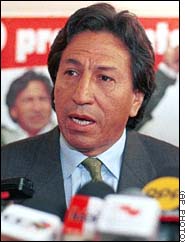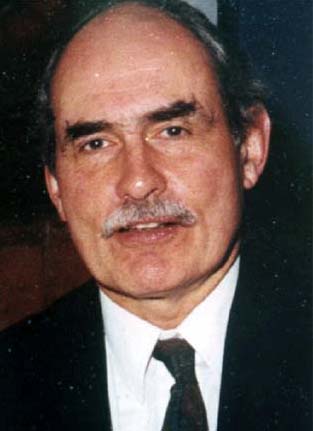
Peru RPCV David Scott Palmer, director of the Latin American Studies Program at Boston University says Toledo continues to lurch from political crisis to political crisis. However, the main opposition parties, while calling for Cabinet changes, have stopped short of a formal request for Toledo's resignation.
Peru chief likely to complete his term
Question: Unpopular Peruvian President Alejandro Toledo did not travel to Mexico last month for the EU-Latin America summit in order to deal with continued unrest and protests against his government. Will Toledo be able to see his term through to its end in 2006? What impact would his early departure have on Peru's business and investment climate?

Answer from David Scott Palmer, director of the Latin American Studies Program at Boston University: Toledo continues to lurch from political crisis to political crisis. However, the main opposition parties, while calling for Cabinet changes, have stopped short of a formal request for Toledo's resignation. And Toledo himself has responded with strong measures against road blockages and violent protests and has secured congressional approval for the use of the military to assist police in quelling local unrest. Economic indicators continue to be positive as well. On balance, any announcement of Toledo's departure before the 2006 elections is premature and, for this observer at least, unlikely. Both domestic and international business and financial communities seem to have found that sound economic policy and opportunity in Peru outweigh continuing political uncertainty.
From Michael Shifter, vice president for policy at the Inter-American Dialogue: In light of his monumental political difficulties, Toledo's decision to skip the EU-Latin America summit in Mexico was a wise one. His idea to travel within Peru and 'reconnect with the Peruvian people' was also commendable since it is hard to see how he can govern until July 2006 with just 6 percent approval. Yet, polls show that his campaign has not caught on with Peruvians. Fortunately, despite their disappointment, most Peruvians want Toledo to complete his term. They regard his Cabinet as quite competent. The conventional wisdom is that if he can last through the year, he can probably survive until 2006, since next year the presidential campaign begins. So far, quite remarkably, Toledo's troubles have not affected investment or the economy overall. His early departure, however, would likely heighten uncertainty, and could put the country's sound and steady economic performance at some risk. Peruvians may be worried about Toledo continuing in office, but the possible alternatives make them even more apprehensive.
From Raymundo Morales, senior financial officer at the World Bank in Washington: I think that Toledo will finish out his term. I believe that the only risk in Toledo's future would consist of public protests, which are not likely. The problem -- and the reason that he will stay -- is that the risk of Toledo's early departure would, in turn, create larger insecurities in Peru. Toledo has only a year and a half left before he has to face elections. He will live through this period. Moreover, another central element is that the economic situation in Peru is relatively good. Despite low employment and complicated inflation problems, Peru currently has a stable economy. This stability will allow Toledo to maintain his position.
Portions of Inter-American Dialogue's Latin America Advisor run each Wednesday and Saturday.
